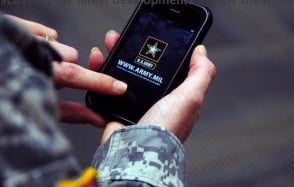U.S. Army testing Windows Phone, Android and iOS--will choose only two

All the latest news, reviews, and guides for Windows and Xbox diehards.
You are now subscribed
Your newsletter sign-up was successful
The U.S. Army is wrapping up a six week testing of three major smartphone OSs: Windows Phone, Android and the iPhone, with hundreds of devices and even some tablets. Evidently no BlackBerry or WebOS love. The point is for the Army to "anoint" two OSs approval for usage by soldiers who are deployed or just currently in service. They won't support more in order to keep development costs down as the Army is set to have their own app store for soldiers. In addition, the Army hopes that the variety will help ward off cyber-attacks as well as giving soldiers ample choice for personal preference.
The military is going with commercially available hardware/software in order to keep costs down, plus as they point out, today's commercially available smartphones are pretty powerful:
"It's a computer; it's a display unit; it's a video-out unit," he said. "Since it is a computer-based utility in a 7-ounce package, we just started realizing there was a vast amount of potential."
Of course, deployment into the battlefield may take some time as no platform currently has encrypted transmissions, but that is something the military hopes to overcome later in the year.
Of note, the iPhone has problems in desert grounds i.e. reception issues between AT&T's coverage and the iPhone's less than stellar performance. Also at least one Android device had to be replaced:
"One popular phone from Samsung Electronics failed to connect to cellular networks and had bugs in its Android operating system, McCarthy said. So Sprint Nextel exchanged it for a different Samsung model, he said"
However, Android and iOS were "well received" so it remains to see how Windows Phone stacks up and if it makes the cut. If Windows Phone does make it into Army hands, it will be a solid boost for the fledgling OS and a vote of confidence by a pretty well known organization. We'd like to think the iPhone and WP7 make the cut while Android, due to its fragmentation, Market security vulnerabilities, poor battery life and app crashing will keep it out of the final choice. We'll keep you posted.
All the latest news, reviews, and guides for Windows and Xbox diehards.

Daniel Rubino is the Editor-in-Chief of Windows Central. He is also the head reviewer, podcast co-host, and lead analyst. He has been covering Microsoft since 2007, when this site was called WMExperts (and later Windows Phone Central). His interests include Windows, laptops, next-gen computing, and wearable tech. He has reviewed laptops for over 10 years and is particularly fond of Qualcomm processors, new form factors, and thin-and-light PCs. Before all this tech stuff, he worked on a Ph.D. in linguistics studying brain and syntax, performed polysomnographs in NYC, and was a motion-picture operator for 17 years.
